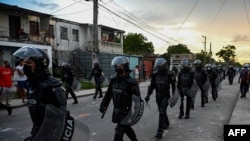The Universal Declaration of Human Rights proclaims in Article 20 that “Everyone has the right to freedom of peaceful assembly and to freedom of association with others, including the right to form and to join trade unions for the protection of his interests.”
Cuba is party to the Universal Declaration of Human Rights and sits on the United Nations Human Rights Council. Cuba’s own Constitution, as revised in 2019, purports to protect the rights of assembly, demonstration and association.
Yet when would-be demonstrators, organized through a Facebook group called Archipelago, requested permission to conduct a nation-wide “march for change” on November 20th, the government scheduled for that same day a “National Defense Day,” putting soldiers in the streets for three days of military exercises surrounding the planned protests.
Archipelago then requested permission to march on November 15. The Cuban government denied this request, stating that “the protests are a provocation and part of a regime change strategy for Cuba tested in other countries." The Cuban regime is subsequently intimidating march organizers by calling for labor union demonstrations on November 15, announcing harsh sentences for detained July 11 protestors, cutting off Internet access, and making public threats.
“The United States strongly condemns the Cuban regime’s decision to deny permission for peaceful protests to take place on November 15. By refusing to allow these demonstrations, the Cuban regime clearly shows that it is unwilling to honor or uphold the human rights and fundamental freedoms of Cubans,” said U.S. State Department Spokesperson Ned Price.
“The United States remains deeply committed to the Cuban people, their right to assemble peacefully and express themselves, and their struggle to freely choose their leadership and their future.”














